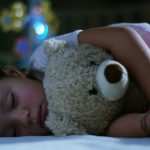
Spider Bite in Children- Prevention And Treatment by Dr Chetan Ginigeri
5 min readWritten by Editorial Team

The spider in ‘Incy Wincy Spider’ rhyme is all cute and never bites. But the real spiders are different and some of them do bite. Spiders are everywhere. Hence it is not possible to keep your child completely away from them. Spiders do not purposely harm children. Once a child spots a spider, they will want to examine how the spider crawls, makes a web, eats, and whatnot. While doing so they might end up getting bitten. So, you must know how to spot spider bites in children and treat them.

- Spider Bite in Children
- Causes of Spider Bite in Children
- Types of Spiders To Look Out For
- Symptoms of Spider Bite in Children
- How is a Spider Bite Diagnosed in a Child?
- Treating Spider Bites in Children
- When to Worry About Spider Bite in Children?
- Preventing Spider Bites in Kids
Spider Bite in Children
More than 40,000 species of spiders have been identified to date. Except for a few, all spiders are poisonous. But not all bite. The fangs of most of the spiders are short or delicate, preventing them from penetrating through human skin.
In some cases, the poison from a spider bite is not strong enough to cause significant damage. One can treat that as a normal insect bite. But some venomous spider bites can be deadly.
Causes of Spider Bite in Children
Spiders don’t bite until they are threatened and only do it as self-defense. As children are curious, they always try to catch insects. They would put their feet on the spider or hold it between their hands or trap it in a box. This threatens them.
Spiders mostly live in places that are not cleaned regularly. The two spiders that you should look out for are the black widow and brown recluse. Even these spiders are not wandering just anywhere in your house. So, until your kid is going through old stuff in the basement, and disturb them, they won’t get bitten.
Types of Spiders To Look Out For
There are two types of spiders, namely, black widow spiders and brown recluse spiders. Let’s understand more about them:

Black Widow Spiders
As the name suggests, black widow spiders have a black shiny hairless body and red hourglass shape on their bellies. The size of black widow spiders ranges between 3mm to 13mm. They live in quiet areas and are not aggressive. They attack only when disturbed.
If ever bitten by a black widow spider, rush your child to the hospital. The toxins released by these spiders can harm a child’s central nervous system.
Brown Recluse Spiders
Brown recluse or violin spiders are brown and have dark violin shape mark on their head. They are one inch long and are found in basements, closets, attics, or under piles of wood, rocks, or leaves.
Symptoms of Spider Bite in Children
Most spider bites are not that painful and resemble a bee sting. Commonly, home spider bites symptoms include a bite mark with:
- A bump on the skin
- Redness
- Swelling
- Itching
- Slight pain
Other than that, the symptoms can vary depending on the types of spider bites.

Symptoms of Black Widow Spider Bite in Children
You might be able to see puncture marks on the site of the bite (It can be very small). The symptoms may look like other illness and include:
- Pain, burning, swelling, and redness around the bite
- Painful muscle cramping within 8 hours
- Severe stomach cramps
- Facial swelling and tearing of eyes
- Nausea and vomiting
- Headache and dizziness
- Breathing trouble due to restlessness and anxiety
- Sweating
- Increased saliva
- Shaking, weakness, or not being able to move
Symptoms of Brown Recluse Spider Bite in Children
You might not see the reaction right away after the bite from the brown recluse spider. It can become noticeable after hours. The symptoms may look like other illness and includes:
- Swelling and redness (can also be deep blue or purple like bull’s eye) at the site of the bite.
- Headache and body ache
- Nausea or vomiting
- Chills and fever
- Joint stiffness or pain
- Tiredness
- Body rash
- Blister or ulcer that turns black
Symptoms of an Allergic Reaction
Spider bite’s allergic reactions include:
- Facial swelling
- Difficulty in breathing
- Chest tightness
- Difficulty in swallowing or breathing
If you see the above-mentioned symptoms after a spider bite on a child, seek medical help right away.
How is a Spider Bite Diagnosed in a Child?
Take your child to the hospital. The healthcare provider will check the bite area and other symptoms. Always listen to what your child has to say about the bite. If they can describe the insect (to identify if it was or not a spider), it will help.
If by any chance you can capture the spider without harming yourself or your kid, do so. It can help get the proper treatment right away.

Treating Spider Bites in Children
Treatment for spider bites will differ depending on the child’s health, age, symptoms, and the severity of the bite. You can do below mentioned things while you wait for medical help:
- Keep the area clean with soap and water. Do this several times until the bite heals.
- Put an ice pack wrapped in cloth on the bite.
- To reduce the risk of infection, apply the antibiotic ointment. Keep your child’s hands clean as they keep touching the bite.
- Give an age-appropriate dose of acetaminophen or ibuprofen to ease the pain. Consult your doctor before giving medication.
- If the bite is on arms or legs, raise the site to reduce swelling.
If the Bite is from the Black Widow spider
Depending on the severity, your child may require – muscle relaxants, pain relievers, and other medicines. Hospitalization may be advised.
If the Bite is from Brown Recluse spider
There is no proper medicine for bites from a brown recluse. Depending on the severity, your child may require – administering medications, or even surgery of the infected area. Hospitalization may be required.
When to Worry About Spider Bite in Children?
You should call a doctor or get medical help for your kid right away if:
- Any symptoms of an allergic reaction can be seen.
- There is a rash after a bite.
- The bite is from a black widow or brown recluse spider or has those symptoms.
- The site of the bite looks infected – increased redness, swelling, or pus.
- Your child complains of increased pain.
Preventing Spider Bites in Kids
Prevention is always better than cure!
- Make your child wear clothes with long sleeves and pants while playing outside.
- Don’t keep their toys or clothes under the bed.
- Teach them not to disturb the spiders ever.
- Also teach them to shake blankets, clothes, or shoes lying on the floor.
- Keep their bed away from walls.
- Make sure basements, attics or garages are free of spider webs.
- Cut grass short and remove logs from the play area.
- Make sure their tetanus shots are up-to-date.
Spiders may be intriguing but spider bites are not. Keep your child away from the spider as much as possible. Make sure to follow the prevention tips to avoid spider bites. Keep antibiotic creams handy. If the symptoms are severe seek medical help right away.
Read Also: Bites, Cuts And Scratches-First Aid Guide For Kids

Editorial Team,
With a rich experience in pregnancy and parenting, our team of experts create insightful, well-curated, and easy-to-read content for our to-be-parents and parents at all stages of parenting.Read more.
Responses (0)
Want curated content sharply tailored for your exact stage of parenting?
Related articles

Sleep Talking in Kids – Is it Common and Top Tips to Deal With

Toilet Training Kids With Autism – Some Helpful Tips

Hematuria (Blood in Urine) in Children – Causes, Symptoms and Treatment

Top 100 Friendship and Learning Quotes For Preschoolers

10 Easy Independence Day Craft Ideas For Kids

Top 5 Counting Songs For Kids
Sponsored content
Discover great local businesses around you for your kids.
Get regular updates, great recommendations and other right stuff at the right time.





